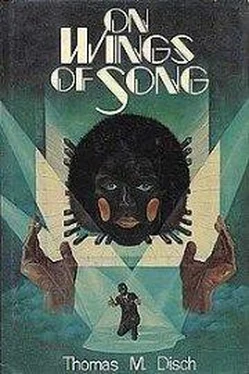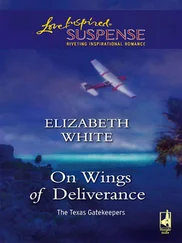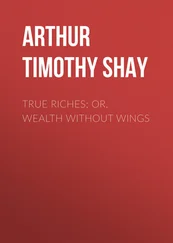For two months he’d been letting his skin fade back to its natural color when an incident at the Natural History Museum made him think again. He was wandering lonely as a cloud among cases of curious rocks and mineral specimens, letting his mind get lost in the twists and turns, the dazzle and glitter of Nature’s own chinoiseries, when out of the dim past stepped Larry, the counterman of the now defunct Dodge ’Em Dougnut Shop. Larry, with more directness than grace, dropped a metaphorical handkerchief at Daniel’s feet, waited to see if it would be picked up, and, when it wasn’t, moved on to some ore-bearing boulders with a wistful, hard-boiled, “All right, Sambo, whatever you say.” And never a glimmer of recognition. There was a time, and rather a long one, when Daniel had seen Larry on the average of twice a day to pick up his phone messages and generally to coze. Larry, admittedly, had a partiality for phoneys, but even so! Is love as blind as that?
Daniel knew that every time he sang at Marble Collegiate he was taking a calculated risk of being recognized by someone from the still dimmer past. Because of Van Dyke’s association with the P.R.L. there was a constant influx of church groups and convention delegates dropping in for the Sunday services, and among these visitors there was bound, sometime, to be someone from Amesville or environs who’d known the old, unreconstructed Daniel Weinreb. His fears hadn’t finally stood in the way of his taking the job, but it might be just as well to continue to wear a mask that had proven so effective. Everyone would suppose he remained a phoney by preference, but that couldn’t be helped. Besides, admit it, it had its moments.
He determined, at least, to change his markings. On his next visit to the cosmetician he had a small, mandorla-shaped spot bleached out high on his forehead, a process as painful as it was expensive. Then, to his great and immediate relief, the circles on his cheeks were filled in and his frizzed hair was straightened and cut to form a bang of oily ringlets obscuring the upright almond of whiteness on his brow. The new mask, being less flaunting, was even more effective as a disguise. His own mother, as the saying goes, wouldn’t have known him now.
A year passed: a year immense with events, prodigies of history and of his own changed heart (if the heart it is, indeed, that registers the sense of vocation, of being summoned to a destined task, and not the eyes, or hands, or spine); a year of blessed tumult; a happy year too quickly gone by. What he did in that year could be quickly told. With Mrs. Schiff he finished a draft of a full-scale two-act version of Honeybunny Time , which Tauber immediately began showing to producers (all of them thought it was a put-on), and he wrote, or re-wrote, some seven or eight songs of his own. But what he learned would require a fairly epic catalogue. Insights blossomed into fugitive visions, branched into viable propositions, interlocked into systems, and the systems themselves seemed to resonate mysteriously with all manner of things, great and small, with his hugest, haziest intuitions as with the curves and colors of a gladiolus in a plastic pot. It was as though he’d been offered an interlinear translation to the whole span of his life. Old chunks of unsorted awareness fell together in patterns as lucid as a Mozart melody. Once, home alone and scaling the heights of Don Giovanni , the shape of the day’s epiphany was just that, a mere seven notes that seemed, from the height at which he heard them, to say more of justice, judgement and tragic fate than all of Aeschylus and Shakespeare rolled into one. It didn’t have to be music that got him going, though it usually was, somehow, a work of art and not the raw materials of Nature. New York doesn’t have that much unmodified Nature to offer, except its skies and what could be made to glow in the park, but it was chock-full of artifice and booming day and night with music. Daniel didn’t want for stimuli.
How long could one go on summing things up like this? Mrs. Schiff said forever, so long as one remained on friendly terms with one’s Muse. But who was the Muse and what did she require? There Mrs. Schiff could offer no oracles.
The question was important to Daniel, for he’d come in a rather superstitious way to believe that possibly Boa was his Muse. Hadn’t his awakening coincided with the time that he’d brought her here to live with him? But how ridiculous, to speak at all of ‘living’ with her, when she was nothing but an empty shell. It was with Mrs. Schiff, it was with Rey, that he’d lived for these three years. Yet he didn’t for a moment suppose them to be Muses. They’d been his teachers; or, if that didn’t do them sufficient honor or express the size of the debt, his Masters. The Muse was something, or someone, else.
The Muse, first of all, was a woman, a woman to whom one remained faithful, and Daniel had, in his fashion, remained faithful to Boa. This might or might not be significant, might or might not connect to some fundamental bedrock of truth beneath the unexplored murk of the subconscious. When it wasn’t shining in the clear sunlight of joy, sex could be infinitely mysterious. But Daniel’s conception of Boa as his Muse was more literal than that. He thought of her as an active presence, a benign will-o’-wisp, touching his spirit and lighting his way with unseen, subliminal glimmerings. In much the same way he had, in his earliest youth, imagined his mother flying to him from far away, hovering over him, whispering to him, regarding him with a mournful, secret love that had been, nevertheless, the force that had sustained him through the desolations of the first loneliest years in Amesville. He had been wrong then; his mother had not been with him, had never known how to fly. But did that mean he was wrong now? Boa was a fairy; she might be with him; he believed she was, and, believing it, he spoke to her, prayed to her, beseeched her to let him off the hook.
For the free ride was over. Rey, though he’d regarded it as an unqualified waste of money, had fulfilled the terms of their agreement. Now, with that debt satisfied, it was up to Daniel. Boa’s minumum weekly requirement cost a whopping $163, and there was no let-up in sight, as this wasn’t the black market price. Rationing was over, and Daniel was able to buy her supplies directly from the First National Flightpaths’ pharmacy. $163 represented the basic cost of one week’s vacation outside your body as fixed by the new Federal guidelines. By this means the government hoped to discourage fairies from permanently abandoning their vehicles by the roadside. Logically Daniel had to approve the new uniform code Congress had come up with — even in this particular. Alackaday, who would have supposed that such a wonder’s coming to pass would have been nothing but a new source of grief for Daniel, who had marched in so many parades and sung at so many rallies in this very cause? But such was the case, and though there had been a few woeful outcries in the press from parents and spouses (and even a granddaughter) who were in the same costly fix as Daniel, there really wasn’t much hope of this law being changed, for it represented a genuine concensus.
$163 stood at the borderline of what was possible and left a very scant residue from which to supply his own necessities. It was painful, it was downright cruel, to be earning a good living for the first time in years and still to have no security, no comfort, no fun. He let Boa know it in no uncertain terms (assuming she was listening in). Enough was enough. He wanted to be rid of her. It wasn’t fair of her to expect him to go on like this. Fifteen years! He threatened to phone her father, and set deadlines for doing so, but since these threats weren’t carried out, he had to assume either that she wasn’t listening, or didn’t believe his threats, or didn’t care. Upping the ante, he menaced her with being disconnected from the umbilicus of tubes that sustained her vegetable life, but this was the merest huffing and puffing. Kill Boa? She was, God knows, an albatross around his neck; she was a constant memento mori (more so than ever, now that Claude Durkin’s tombstone nestled at the foot of her bed); but she was his wife, and she might be his Muse, and to fail in his obligation to her would just be asking for trouble.
Читать дальше












